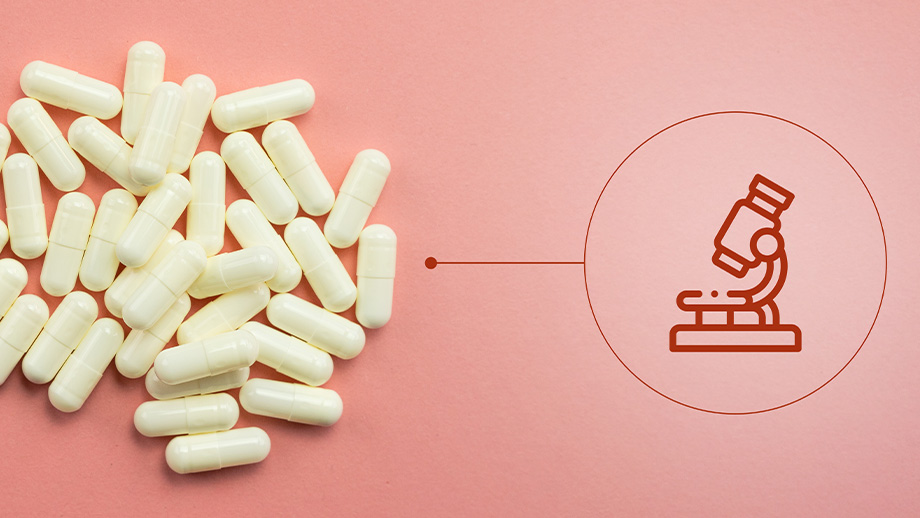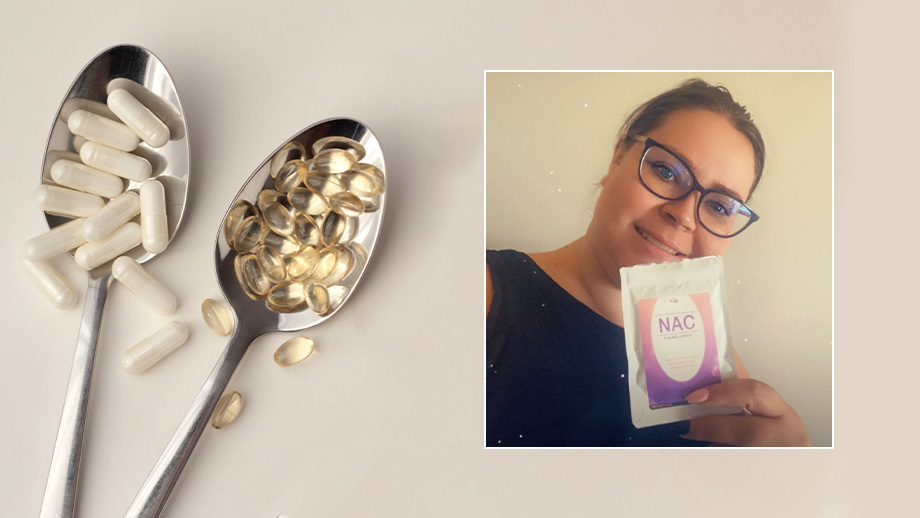One emerging supplement for PCOS that has caught the attention of researchers and healthcare providers is N-acetylcysteine or NAC. Doctors have used this antioxidant for many other health conditions, such as liver and kidney issues and respiratory and immune health. But can it help female health as well?
Let’s dive into the science behind NAC and its potential role in managing PCOS.
Understanding PCOS: A Hormonal Puzzle

Understanding PCOS
We must first understand PCOS’s hormonal complexities to understand how NAC might help. PCOS is often associated with insulin resistance, a condition in which the body’s cells don’t respond effectively to insulin.
This leads to elevated insulin levels, which can trigger the overproduction of androgens (male hormones) like testosterone. High androgen levels contribute to many of the hallmark symptoms of PCOS, such as acne, excessive hair growth, and irregular periods.
In addition to insulin resistance, chronic inflammation can also play a role in PCOS. All of these underlying drivers can contribute to each other in a vicious cycle. But what is NAC, and how can it help with these symptoms?
What Is NAC?
N-acetylcysteine (NAC) is a unique compound because it serves dual roles as an amino acid and an antioxidant. NAC starts its journey as an amino acid derivative of cysteine. Your body makes cysteine in small amounts. Amino acids are organic compounds with a specific structure and are the building blocks of proteins in the body.
Now, let’s delve into NAC’s antioxidant role. Antioxidants are molecules that protect our cells from damage caused by free radicals. Free radicals are unstable molecules that can harm our cells and DNA. NAC becomes an antioxidant because it has a special ability to donate electrons.
When free radicals cause trouble, they steal electrons from other molecules, which can lead to cell damage. NAC steps in and donates an extra electron to these troublemakers, neutralizing them in the process.
By doing so, NAC helps prevent cell damage and reduces oxidative stress in the body, which is associated with various health issues, including aging and chronic diseases.
Many studies have also found NAC can lead to improvements in PCOS through managing menstrual cycles, ovulation, blood sugar, insulin, and others.
Why You Should Consider Taking NAC for PCOS

Taking NAC For PCOS
NAC has shown promising results in treating testosterone levels, insulin resistance, menstrual cycles, ovulation, and more. Let’s dig into the research to determine if NAC can be a successful treatment for PCOS.
Reducing Insulin Resistance
One of the key mechanisms by which NAC may benefit people with PCOS is by improving insulin sensitivity. Several studies have shown that NAC can enhance the body’s response to insulin, making it easier for cells to take up glucose (sugar) from the bloodstream. It even significantly lowered fasting glucose levels compared to metformin.
This helps lower insulin levels, which may reduce the production of androgens and alleviate some PCOS symptoms.
Balancing Hormones
Beyond its impact on insulin sensitivity, NAC has shown promise in regulating hormonal imbalances associated with PCOS. One study found that it significantly reduced testosterone levels while raising follicle-stimulating hormones (FSH).
Lower androgen levels can lead to improvements in skin health, acne, hirsutism (excess hair growth), and menstrual cycles. However, many of these symptoms are subjective. Some people will experience different results.
Fertility and Ovulation
NAC may offer additional benefits for individuals with PCOS who are trying to conceive. Some studies have indicated that NAC supplementation could help improve ovulation and increase the chances of successful pregnancy.
One review showed women taking NAC were nine times as likely to have ovulation and three times as likely to have pregnancy and live birth. It also increases levels of follicle-stimulating hormone, which leads to the healthy maturation of an egg during ovulation.
Organ Health
NAC has also proven beneficial for the brain, heart, and liver. One review found it useful for substance abuse, schizophrenia, obsessive-compulsive and related disorders, and mood disorders.
This is due to how it interacts with neurological pathways and oxidative stress. Women with PCOS often have a higher risk of developing depression, anxiety, and mood disorders, making this a promising supplement.
Additionally, due to NAC’s antioxidant power, it can help detoxify the liver. Women with PCOS also have an increased risk of fatty liver disease. Thus, NAC may help reduce toxins and improve liver health in women with PCOS.
Another study noted its ability to improve diabetes-related cardiac problems. Women with PCOS also have a higher risk of developing cardiovascular disease. NAC can help lower bad cholesterol and the risk of heart issues.
NAC Versus Metformin for PCOS

NAC Vs. Metformin For PCOS
Many studies have compared the effects of NAC and metformin on insulin resistance, BMI, androgens, and ovulation. The research found that it significantly reduced BMI, total testosterone, and fasting glucose levels compared to metformin.
However, the study stated, “Compared to placebo or metformin, NAC did not significantly improve fasting insulin.” Metformin still achieved better results for insulin resistance. But, NAC has promise in generally reducing androgenic symptoms of PCOS and blood sugar levels.
Additionally, metformin improved ovulation and menstrual regularity more than NAC. But NAC was still very effective in improving these levels compared to placebo.
We can conclude that NAC works better for weight, hyperandrogenemia, and fasting glucose. But, other medications or combinations of the two can be more effective for other aspects such as insulin resistance. It really depends on several factors and your health goals and symptoms.
Is NAC an FDA Approved Supplement or Drug?
Currently, the U.S. Food and Drug Administration classifies NAC as a drug because it was marketed as such before it was sold as a supplement. Currently, it is used to treat COPD, Parkinson’s and Alzheimer’s, HIV, bronchitis, and other conditions.
However, as of August 2022, it is under review to change its designation from a drug to a supplement. The FDA exercises enforcement discretion regarding the sale and distribution of NAC as a supplement. This means they can choose to ignore the rule as long as the product doesn’t make certain health claims.
According to NutraIngredients USA, Amazon removed the product for a year but has recently made it available again after the FDA revision was made.
Can You Get NAC as a Supplement in the US?
Just because NAC is not available as a supplement in the United States doesn’t mean you can’t still purchase it. You can still find NAC supplements from other companies and online.
It may be difficult to find it in the vitamin aisle in stores. But it’s not illegal or unsafe to take NAC as a supplement. However, always consult with your doctor about using it.
Where Can You Buy NAC Supplements for PCOS?
As mentioned earlier, you can buy NAC supplements on Amazon, but please ensure you trust the company. Just because it’s on Amazon doesn’t mean it comes from a reliable and safe company.
You can find NAC capsules here at Health & Balance Vitamins. The Australian-owned company ships from warehouses in Australia and the United Kingdom, with one opening soon in the United States.
Dosage, Safety, and Considerations

Dosage, Safety, and Considerations For NAC
While NAC is generally considered safe when used at recommended doses, it’s essential to remember that supplements can interact with medications and may not be suitable for everyone.
NAC may interact with blood thinner medications. You can safely take it while trying to conceive, pregnant, and breastfeeding. Your body also needs enough B vitamins, including folate and vitamin B12, to make cysteine.
There is no recommended dosage, but generally, you can take 500 to 1,800 milligrams a day. However, oral capsules have poor absorption. It has few side effects; however, some may rarely experience nausea, gas, diarrhea, or vomiting when taking large quantities.
Before adding NAC to your PCOS management plan, it’s crucial to consult with a healthcare provider who can assess your individual situation, provide guidance on dosages, and monitor your progress.
NAC for PCOS: A Roundup
NAC is a powerful antioxidant and amino acid. It is an FDA-approved medication under review for sale as a supplement in the United States.
NAC has many health benefits for women with PCOS, including:
- Improving insulin resistance
- Improving high androgen levels
- Improving fertility and ovulation
- Improving pregnancy outcomes
- Improving brain, heart, and liver health
Though metformin and other PCOS treatments may work better, NAC still shows promising results. With ongoing research and the support of healthcare professionals, NAC could become a valuable tool in the fight against PCOS.
Always talk to your doctor about your goals and symptoms. They can help you determine whether NAC can become a helpful supplement in your PCOS plan.












